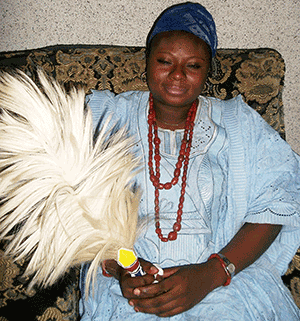Special Correspondent, JULIUS ALABI, traces the history of Akure, Ondo State capital, and why its indigenes are referred to as Omo Ekun or Oloyemekun
Akure, capital city of the Ondo State, has an interesting historical account. It is also one of the densely-populated cities in the country. The city has a fair share of development and mineral deposits which make it a commercial hub.
Tourist sites
Regent Adetutu Adesida
Some of the places frequented by visitors to Akure are Deji’s old and new palaces (Aafin Deji), Aafin Oba Osolo, Aafin Oba Iralepo, Oba’s Market (Oja Erekesan) in Oke Eda, the Federal University of Technology Akure (FUTA), the Old Colonial Secretariat, among others.
Akure personalities
In addition, Akure, popularly called the city of Oloyemekun, has prominent sons and daughters that have excelled in all spheres of life. Among these are Dr. Olu Falae, Secretary to Ibrahim Babangida’s Military Government and one-time presidential candidate; Reuben Fasoranti, leader of the pan-Yoruba socio-cultural organisation, Afenifere; the late Akinola Aguda, former Chief Justice of Botswana; and a host of others.
Akure Oloyemekun
Akure Oloyemekun is derived from the name of the first monarch of the town called Asodeboyede, who was referred to as Omo Ekun Asodeboyede, later shortened to Oloyemekun.
It was, however, gathered that Asodeboyede’s bravery and doggedness prompted his descendants to adopt the name Oloyemekun which is synonymous with Akure till today.
Asodeboyede, according to oral tradition, means “he who hunts has arrived from Oye”. The people of Akure were said to among the beneficiaries of the early missionaries that came to introduce education in the South West geo-political zone of Nigeria.
Omo Ekun
TheNiche learnt that in the past, Akure was an independent region, until the 19th century, when it was included in the Benin Kingdom. In 1894, the control over the region passed on to Britain.
The city connects to other Nigerian cities such as Ibadan, Lagos, Benin, Osun, Ekiti, Port Harcourt, Kaduna and Abuja. According to the history of the town, Akure, like other towns in Yoruba land, has its origin traced to Ile Ife, the cradle of civilisation of the Yoruba. The town was founded by one of the sons of Oduduwa who was described as very brave, bold and courageous.
Akure indigenes are fondly called “Omo Akure Oloyemekun a mu ida s’ile m’ogun enu pani” (meaning sons and daughters that sheathed the sword and kill with mouth). It is also a common knowledge for an Akure indigene to regard himself as Omo Ekun (son of a tiger). Till his death, Wunmi Adegbonmire, an indigene of Akure, was popular with the name Omo Ekun like others. He even gave the name Omo Ekun to his column in the Nigerian Tribune at that time.
Nomenclature
Kanye Eleko, a renowned septuagenarian journalist and secretary, Deji-in-Council, who narrated how the people came about the name and other mystical things being associated with them till date, explained that the history of Akure, like other Yoruba towns, is traced to Oduduwa, the great ancestor of the Yoruba race. According to him, the actual date when Akure was founded is unknown, adding, however, that Omoloju, the son of Iyangede of Epe, a village of about 10 kilometres north of Ondo, was the first person to settle in the town.
According to him, Omoloju, while trying to clear a bush-path on a spot between Isinkan and Oke-Aro junctions on Arakale road, had the wrist beads (akun) on his hand cut. “The spot on which the beads broke was named ‘Akun-re’ (meaning ‘beads cut’). This was later contracted to Akure.
“When he settled at the place, Omoloju installed himself as Alakunre. The people in other two sections of Akure – the Isinkan, whose head is Aralepo, and the Isolo headed by Osolo and whose tradition are distinct from those of the majority inhabitants – also represented earlier settlers on the site of the present Akure,” Eleko added.
Origin
He stressed that the origin of the present kingdom can be traced to Ife, ancestral home of the Yoruba race. According to the tradition, the first Oba of Akure was a grandson of Oduduwa. His father, it was said, was Ekun, who died when he was conceived; hence Oduduwa took care of his grandchild. When he grew up, he played around in the courtyard of Oduduwa at Ile-Ife and the people there called him Omo-Ekun, the epithet by which successive Deji of Akure were later known; hence tiger became the traditional symbol of the Deji.
“During the time Omo-Ekun was growing up, he lived at Inanmu near Ife, where all the children and grandchildren lived. Before the migration of the princes and princesses from Ife, Oduduwa forced Omo-Ekun to undergo a seven-day endurance test. At this time, he killed an eda (rat) with a rattle (aja) in a small house without windows where he was put. Thereafter, Omo-Ekun was called Ajapada,” Eleko said.
The endurance test is still being commemorated in Akure during the annual celebration of Ile Ifunta festival when the Oba withdraws into an inner part of the palace for seven days.
Akure monarchy
Eleko, however, stated: “When Oduduwa’s children were leaving Ife, Ajapada demanded from his grandfather gifts such as he had given to other children. Oduduwa, who had already distributed what he had, however gave his grandson a garment of medicine (ewu ogele), which he wore on hunting expeditions, and a beaded crown. Ajapada left Ile-Ife in company of his uncle, who later became the Oba of Benin, but stayed behind at Osu near Ilesa before he moved to Igbo-Oye near Efon-Alaye. Ajapada did not stay for long because he was always at loggerheads with the neighbouring monarchs.
“Preceded by a hunter named Olojada, who accompanied him from Ife, Ajapada moved in a south-eastern direction until he reached the present site of Akure where he built a house at the present site of Chief Oye’s compound near the palace. Being a seasoned hunter, he killed an elephant on the spot known as ‘Ori Erin’ now at Oba Adesida Road/Araromi. Junction and for this act of bravery, the people he met at Akure soon took note of his valour and thereby call him Asodeboyede (meaning the hunter has arrived from Oye).
“The influence of Ajapada Asodeboyede grew and later overshadowed that of Alakunre Omoloju. Conflicts soon ensued, but when Alakunre realised that Asodeboyede was a more militant person with overwhelming followers, he surrendered. The Akure gave Asodeboyede the preference to be the first Oba of Akure.”
Deji title
The present title of Deji arose from an episode which linked the Akure dynasty with that of Ijesa. Owa Atakunmosa, seventh ruler of Ijesaland, was said to have journeyed to Benin City where he spent some years in exile. On his way to Benin, he was said to have passed through Akure and gave his daughter in marriage to Ajapada Oriya. When Owa returned, passing through Akure again, he saw that his daughter had given birth to a child and he joyfully placed the child on his laps, putting on him a beaded crown and gave him a name, Olufadeji.
When Olufadeji ascended the throne of Akure, he preferred to use the shortened form of his new name ’Deji, instead of Ajapada, and it is thus that his successors are known to this day. He also assumed the name of his maternal grandfather, Atakunmoa, as his official name, TheNiche learnt.
Eleko added that “the word Oyemekun is derived from the names given to Asodeboyede who happened to be the first monarch of Akure and a direct grandson of Oduduwa. His father’s name was Remilekun Ekun, a son of Oduduwa.
Also, when he came to Akure land, and through his movement and bravery, he was called Asodeboyede. All these names, he said, were combined and shortened to Oloye Omo Ekun which later became Oloyemekun, as that of Eba-odan which is now Ibadan or Oso-igbo now Osogbo.
“We don’t have direct link or relations with ekun, as people may tend to believe; but it was our forebear, Remilekun Ekun, father of Asodeboyede, that was bearing Ekun and he was a son of Oduduwa, not a wild animal like tiger.
“We are using tiger’s statue as a symbol to represent our forebears who were great and brave during their days, especially Asodeboyede who was the first monarch of Akure. If there were photographs during their days and there were photos of Asodeboyede, there would not be need using tiger as the statute to represent him,” Eleko explained.
He said there was a misconception by some historians who claimed that Oloyemekun was literally a chief that caught tiger – one of Akure chiefs who was also a hunter; who during hunting expeditions caught tiger alive and brought it to Akure town, saying such history was not only incorrect but misleading and misinforming.
Yeyejumu of Akure land, Chief (Mrs.) Juliana Akinbo, corroborated Eleko’s explanations. According to him, the Akure people, as direct descendants of Oduduwa, had their origin from Ile-Ife, adding that there was no link whatsoever between the forebears of Akure, the entire Oduduwa dynasty and tiger, a wild animal.
Yeyejumu said that for the fact that they used to call Akure people Omo Ekun or Oloyemekun does not mean that “We are having link or relationship with the animal called tiger. Our forefather’s biological father was Remilekun Ekun. That was why they called his son, Asodeboyede Omo Ekun (meaning the son of the tiger when he was young).
“We don’t have any taboo when it comes to the issue of tiger. In fact, we don’t have anything to do with tigers or other wild animals. We are just using its statute or photograph as a symbol to express how powerful Asodeboyede was during his reign.”
In his submission, Chief Isaac Awopetu stressed that Oloyemekun was referring to Omo Oye, Omo Ekun which was later shortened to Oloyemekun, adding that no Yoruba history linked one clan, lineage or tribe with any animal.
Awopetu was of the opinion that the history of Akure kingdom was too straight and direct for people to be misinterpreting or distorting facts.











